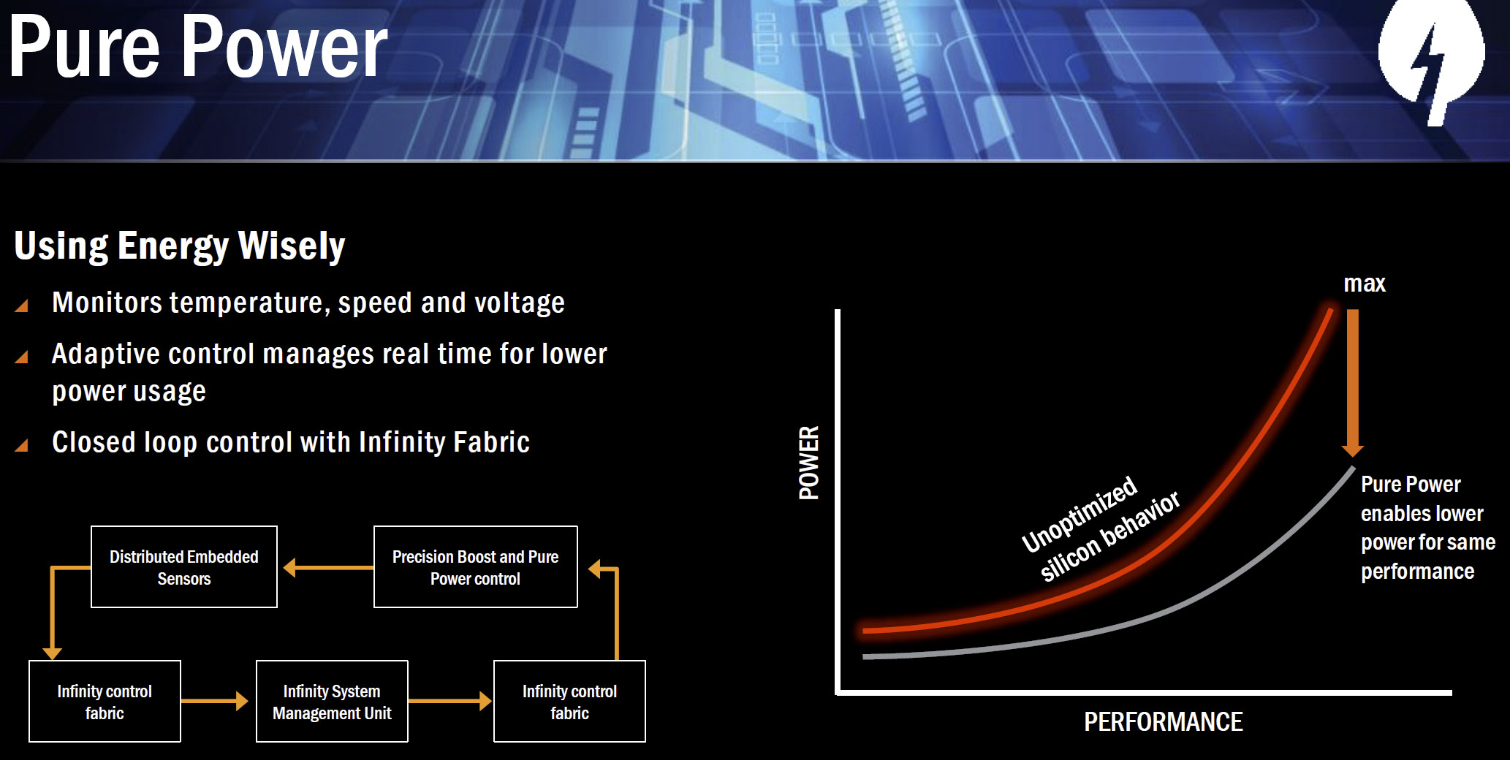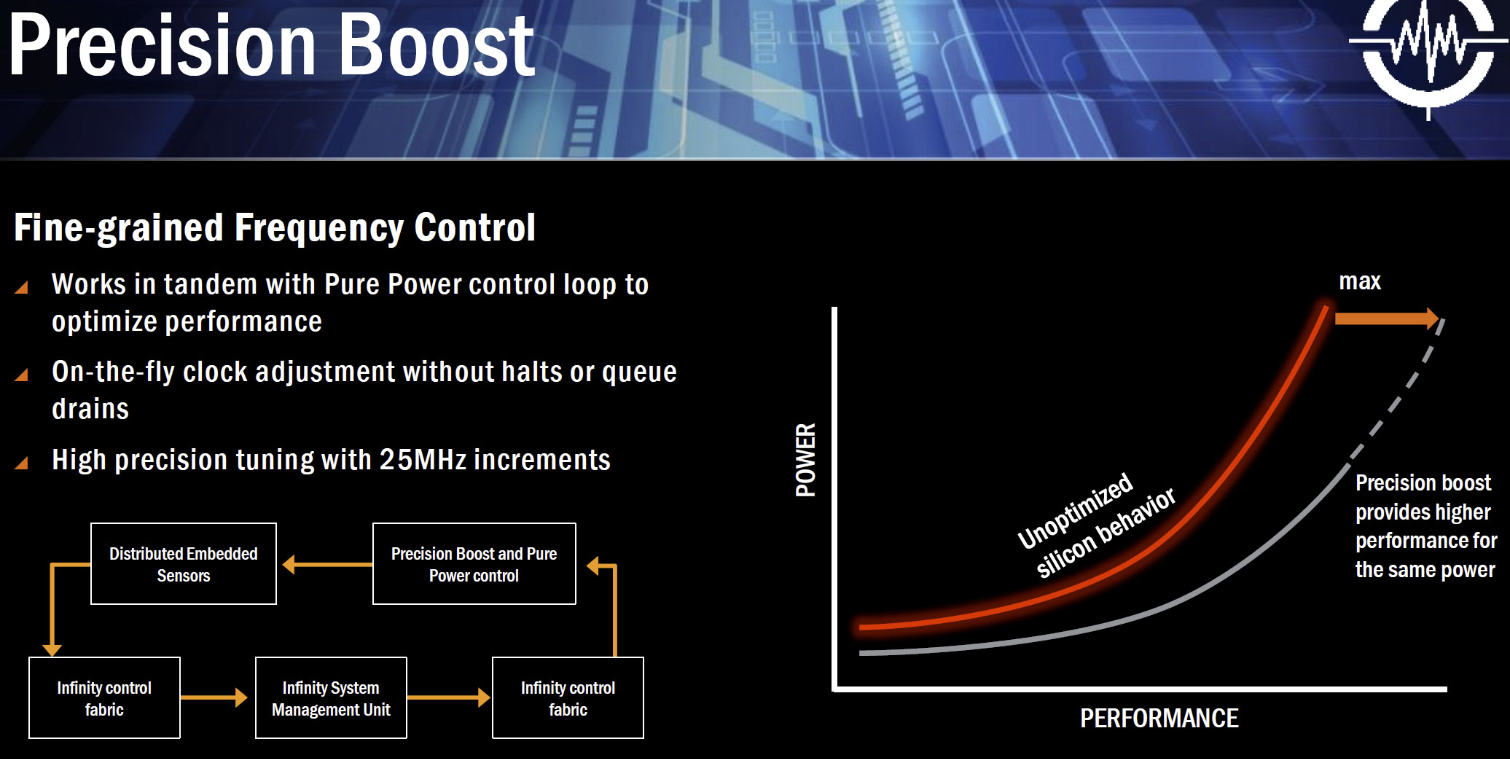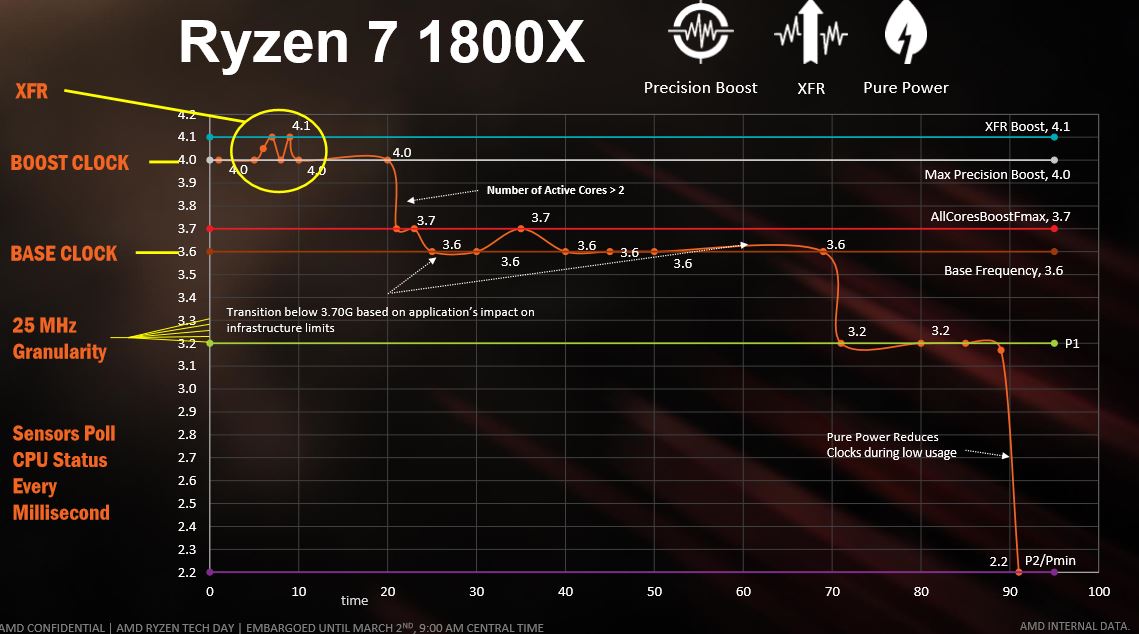AMD Ryzen 7 1800X CPU Review
Why you can trust Tom's Hardware
AMD SenseMI Suite & XFR
AMD's SenseMI feature suite consists of five key technologies that allow Ryzen 7 processors to adjust performance and power consumption parameters in real time.
Pure Power
According to AMD, its Zen architecture employs an array of 1000 sensors accurate to 1mA, 1mV, and 1°C. The Pure Power feature monitors these temperatures, voltages, and currents, enabling real-time adjustments based on decisions made by what company representatives describe as learning algorithms.
Those sensors feed telemetry data across the Infinity Fabric loop to the Infinity System Management Unit at 1ms intervals. The management unit analyzes that data and issues commands across the fabric to adjust voltage and frequency settings for optimal performance. AMD also notes this functionality helps manage its speculative cache features and AI-based branch prediction.
Each piece of silicon is unique, and AMD points out that its algorithms allow the processor to optimize itself based upon its own characteristics. Notably, other semiconductor vendors employ a similar technique to control the power consumption of their processors dynamically.
Precision Boost
Precision Boost adjusts the power/performance curve to optimal settings for the operating environment, much like Intel's Turbo Boost, based on information derived from Pure Power. The algorithms that control Precision Boost facilitate changes in 25 MHz steps, which is of course more granular than Turbo Boost's 100 MHz increments.
On the Ryzen 7 1800X, for example, Precision Boost increases the 3.6 GHz base frequency to 3.7 GHz across all cores, and can push two cores up to 4 GHz. This is important: whereas Intel's Turbo Boost technology varies clock rate based on the number of active cores, Precision Boost draws that distinction between two active cores and anything in excess of two cores, at which point maximum frequency drops to the all-cores number. What you end up with is a nice speed-up in lightly-threaded tasks, but less benefit than Turbo Boost as soon as a third core spins up.
XFR (eXtended Frequency Range)
AMD's eXtended Frequency Range feature allows the processor to dynamically adjust its clock rate above the stock and Precision Boost clocks based on available thermal headroom.
Get Tom's Hardware's best news and in-depth reviews, straight to your inbox.
XFR automatically increases the Ryzen 7 1800X's Precision Boost ceiling by 100 MHz if your cooling solution can keep the CPU running below a certain threshold. We tested with Noctua's NH-U112S SE-AM4 air cooler and Corsair's H100i v2 closed-loop liquid cooler, and both perform well enough to engage XFR, allowing a 4.1 GHz peak clock rate. Unfortunately, we don't have AMD's stock heat sink/fan, so we don't know if it's beefy enough to make XFR work.
AMD claims this feature scales with air, water, and LN2 cooling, but doesn't specify if there's a maximum frequency with LN2.
Interestingly, the Precision Boost and XFR features are intertwined on our Asus Crosshair VI Hero motherboard. If you enable the "Core Performance Boost" setting, the 1800X triggers both Precision Boost and XFR frequencies based on your workload. But you cannot disable either feature independent of the other.
Neural Net Prediction & Smart Prefetch
AMD claims that its Neural Net Prediction capability describes a built-in neural network able to learn application behavior and pre-load instructions before they're needed, while Smart Prefetch learns access patterns to pre-load data into local cache.
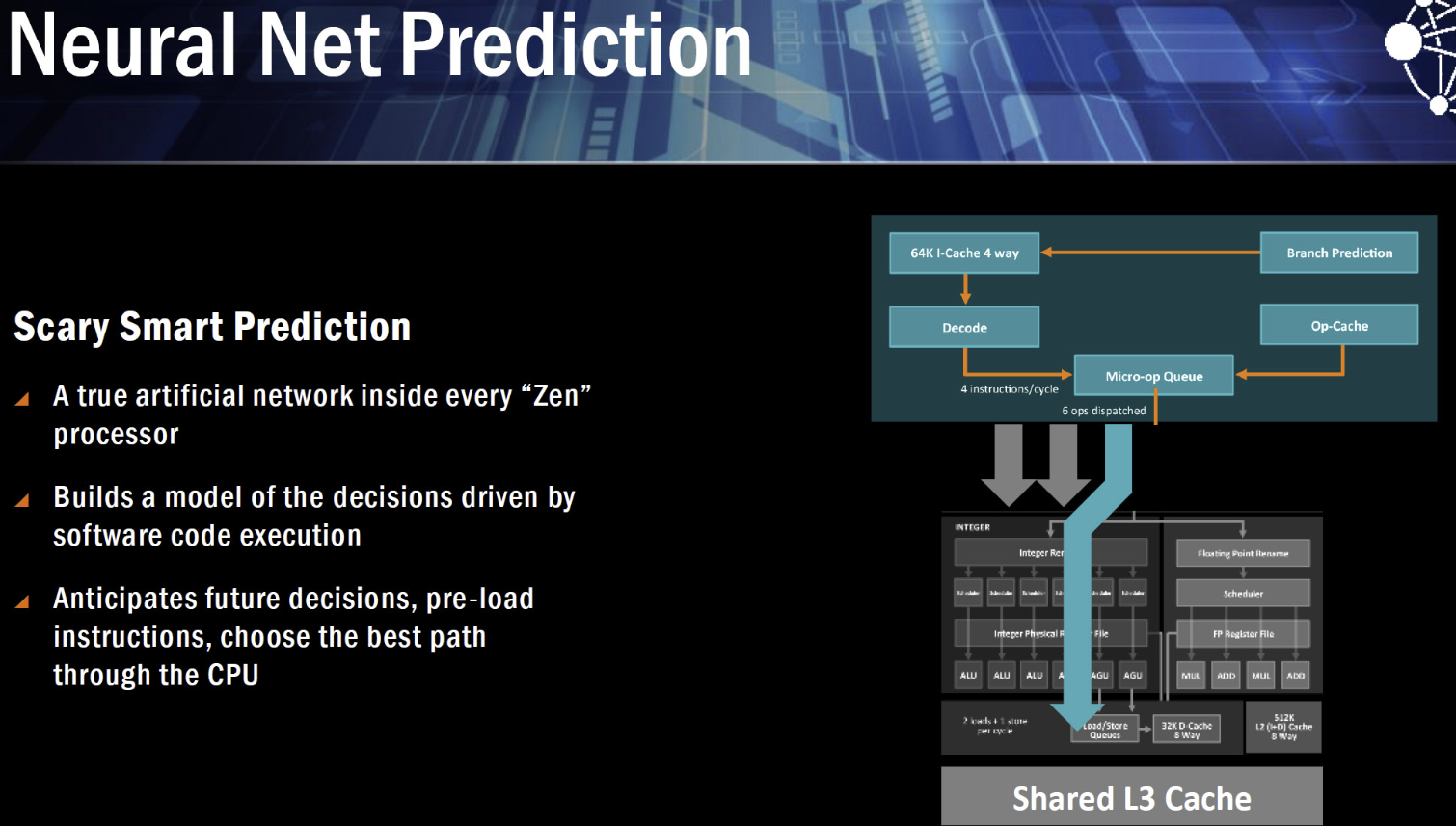
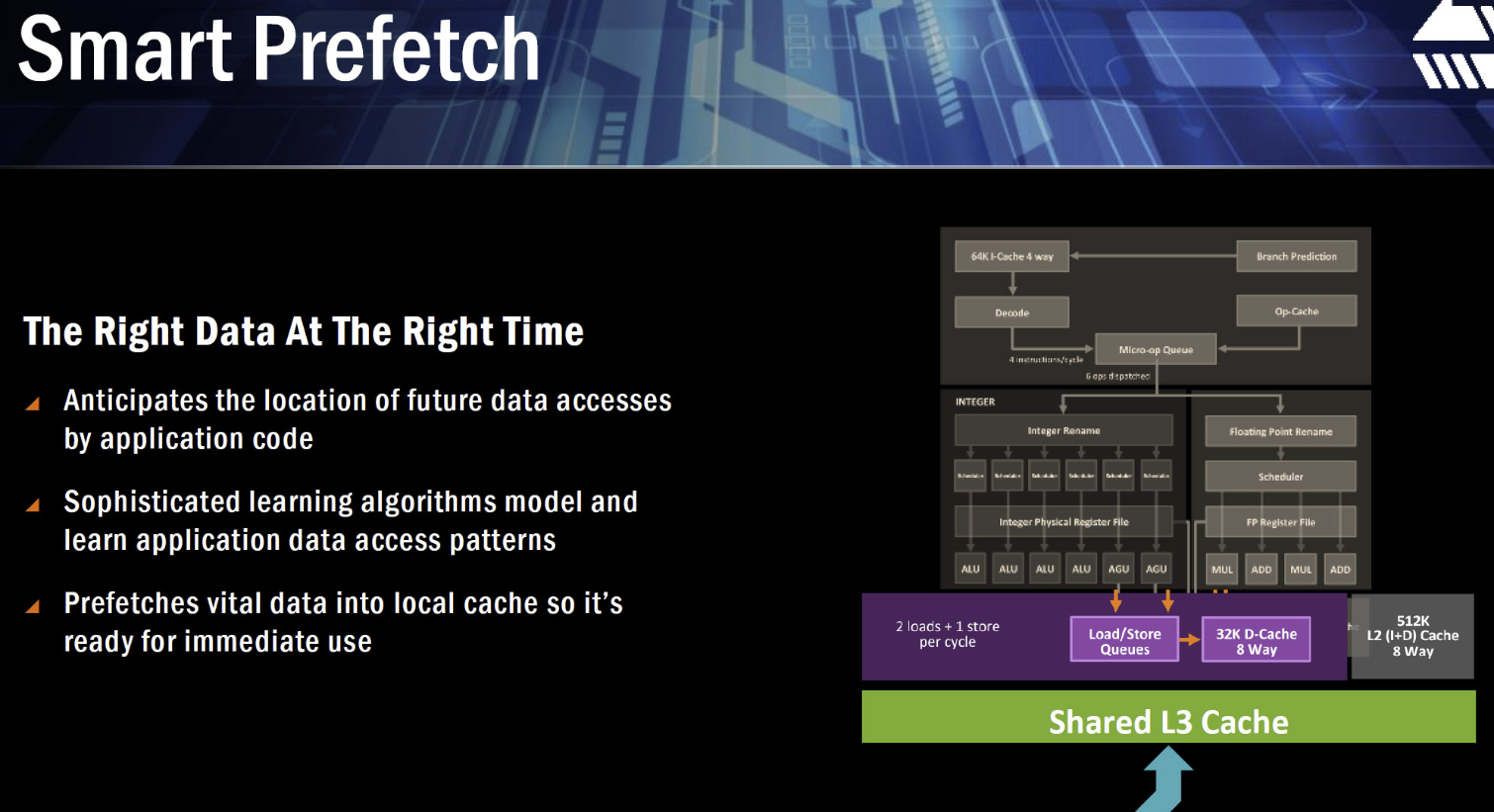
Both features appear to be marketing-speak for AMD's perceptron branch predictor, which debuted in the Jaguar core. Of course, the company likely improved and optimized this technology for Zen, specifically, but it's not magic.

Paul Alcorn is the Editor-in-Chief for Tom's Hardware US. He also writes news and reviews on CPUs, storage, and enterprise hardware.
-
vrumor Well, at the very least, it is competition. Competition drives innovation and lower costs. Well done AMD.Reply -
kiniku Why did I feel AMD was hiding something? Understandably the "gamer market" is comparatively small. But couldn't AMD have designed a CPU that worked well in gaming/desktops and in data centers? Disappointing.Reply
(But I have a 5820K. The best Ryzen in the world would not have had me switch anyway.) -
xryanx123 Bias review as always. Most of your information is obviously screwed up. How do you get 4.0ghz at 1.45v. When that's not even an overclock for the chip (not really at least compared to stock) yet you're already pushing 1.45v? You're tailoring your articles for the uneducated. Duck off tomsReply -
captaincharisma in the end the best anyone can hope from AMD is that it spooked intel enough to lower its pricesReply -
ssdpro In a hurry to compare various site's gaming results, it appears differing sites are finding the same thing: gaming performance is acceptable but below 4c/8t Intel offerings. If you spend your day encoding or multi-thread benching this is a monster bargain.Reply
With the good and bad, I think we can all agree the good here is competition. There is some now. -
Pompompaihn All along AMD was claiming to equal/beat Broadwell-E in comparative tasks at half the price, and from another review that included Broadwell-E, it's done that. I don't recall ANY AMD press saying it was going to beat the 7700K in straight up gaming. So, target set, and hit. That's a win in my book. But now, need to see what they can do with the smaller core count chips and if they can scale frequency to be competitive in the gaming sector.Reply -
Dionisiatis Maybe i missed it but i would love to see a perf/dollar ratio comparison. Im sure Ryzen would occupy the top position, and it would also make it clear that AMD achieved extraordinary results in bringing such high performance to the average consumer that cant 700+ dollars for a CPU.Reply -
jackspeed @Dionisiatis the 7700K is cheaper then the 1800X so for gamers it currently is the best CPU. now games have yet to optimize for the new AMD architecture, so maybe soon it will be a different story.Reply -
Aspiring techie Your "Heating up AMD Ryzen" video on the Power and Temperatures tab is still private. I can't watch it.Reply -
Fails in gaming, and for multitasking stuff i got Xeon 14/28 who is doing all that encoding and other stuff for $300 on eBay.Reply
In my opinion AMD failed and they really pulled BS by fooling people into pre ordering but it turns out that in gaming sucks..
